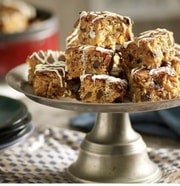Knock half off of your grocery bill! Expert’s secret to saving $5,000 annually!
By
KenAlunan
- Replies 18
For many Australians, the cost of living crisis is hitting closer to home than ever before. Around the nation, families are feeling the squeeze as they juggle skyrocketing expenses with stagnant incomes.
Every trip to the grocery store, every utility bill, every rent payment is a reminder of the financial strain that seems to tighten its grip with each passing month.
What if there was a way to significantly reduce that bill, potentially saving thousands over the course of a year? According to Financial Expert David Koch, there is.
David Koch, the former Sunrise host and current Economic Director at Compare the Market, shared a savvy strategy that could see the average family halve their grocery expenses, saving a whopping $96.37 a week, or $5,011 annually.
The secret? Making the switch from big-brand products to house-brand alternatives.
In a recent video posted on social media, Koch highlighted the substantial price difference between well-known brands and their lesser-known counterparts.
‘So, when you're doing your supermarket shop, what's in a brand name? Well, let me tell you—plenty,’ he said.
‘You are paying plenty more for that loyalty to a brand that you love.’
For example, parents could swap a 56-pack of branded nappies costing $39 for a house brand 50-pack priced at just $11.49.
Similarly, a simple change in shampoo brands could save shoppers $17. These small changes, when added up, could lead to significant savings.
To illustrate the potential savings, Compare the Market conducted a comparison shopping exercise.
They purchased 25 items from a major supermarket and then bought 25 similar items from a challenger supermarket that sells house brands. The result? A nearly halved grocery bill.
This comparison found that making this switch could cut the weekly cost of groceries from $201.19 down to just $103.51—a whopping weekly saving of $97.68.
To illustrate the impact of this change over a larger period Koch said, ‘Now, multiply that weekly shop over a whole year and that's a saving of over $5,000.’
Koch's message is clear, brand loyalty could come at a high cost. Families could save enough money for significant expenditures by opting for house brands.
Koch's advice came at a critical time as Australia grapples with an inflation crisis.
With essentials like bread and cereal rising by 7.3 per cent in the year to March and underlying inflation at 4.4 per cent, the pressure on household budgets is intense.
Given that inflation remains significantly above the Reserve Bank's target range of 2 to 3 per cent, financial markets are preparing for potential interest rate increases instead of cuts in 2024.
Economists anticipate additional rate hikes, making cost-saving measures more crucial than ever before.
You can watch Koch’s video below:
Source: TikTok / @comparethemarketau
Amidst the cost of living crisis, it is fortunate that many savvy Aussies are sharing tips on stretching budgets and cutting costs.
In a previous article, a finance guru shared some money-saving tips for 2024 to help budget-conscious individuals save funds. You can read about it here.

Have you switched to house brands and seen a difference in your grocery bill? Do you have other cost-saving tips to share with our community during these challenging economic times? Share your experiences and tips in the comments below!
Every trip to the grocery store, every utility bill, every rent payment is a reminder of the financial strain that seems to tighten its grip with each passing month.
What if there was a way to significantly reduce that bill, potentially saving thousands over the course of a year? According to Financial Expert David Koch, there is.
David Koch, the former Sunrise host and current Economic Director at Compare the Market, shared a savvy strategy that could see the average family halve their grocery expenses, saving a whopping $96.37 a week, or $5,011 annually.
The secret? Making the switch from big-brand products to house-brand alternatives.
In a recent video posted on social media, Koch highlighted the substantial price difference between well-known brands and their lesser-known counterparts.
‘So, when you're doing your supermarket shop, what's in a brand name? Well, let me tell you—plenty,’ he said.
‘You are paying plenty more for that loyalty to a brand that you love.’
For example, parents could swap a 56-pack of branded nappies costing $39 for a house brand 50-pack priced at just $11.49.
Similarly, a simple change in shampoo brands could save shoppers $17. These small changes, when added up, could lead to significant savings.
To illustrate the potential savings, Compare the Market conducted a comparison shopping exercise.
They purchased 25 items from a major supermarket and then bought 25 similar items from a challenger supermarket that sells house brands. The result? A nearly halved grocery bill.
This comparison found that making this switch could cut the weekly cost of groceries from $201.19 down to just $103.51—a whopping weekly saving of $97.68.
To illustrate the impact of this change over a larger period Koch said, ‘Now, multiply that weekly shop over a whole year and that's a saving of over $5,000.’
Koch's message is clear, brand loyalty could come at a high cost. Families could save enough money for significant expenditures by opting for house brands.
Koch's advice came at a critical time as Australia grapples with an inflation crisis.
With essentials like bread and cereal rising by 7.3 per cent in the year to March and underlying inflation at 4.4 per cent, the pressure on household budgets is intense.
Given that inflation remains significantly above the Reserve Bank's target range of 2 to 3 per cent, financial markets are preparing for potential interest rate increases instead of cuts in 2024.
Economists anticipate additional rate hikes, making cost-saving measures more crucial than ever before.
You can watch Koch’s video below:
Source: TikTok / @comparethemarketau
Amidst the cost of living crisis, it is fortunate that many savvy Aussies are sharing tips on stretching budgets and cutting costs.
In a previous article, a finance guru shared some money-saving tips for 2024 to help budget-conscious individuals save funds. You can read about it here.
Key Takeaways
- David Koch provided insights on how Australian families can significantly reduce their grocery bills by opting for house brand products over big-name brands.
- By making the switch, families could save an average of $96.37 per week, equating to roughly $5,011 over a year.
- Koch suggested substituting a range of items, including nappies and shampoos, for lesser-known brand versions to achieve these savings.
- Australia's cost of living crisis is projected to worsen, making these savings particularly pertinent as inflation remains high.









